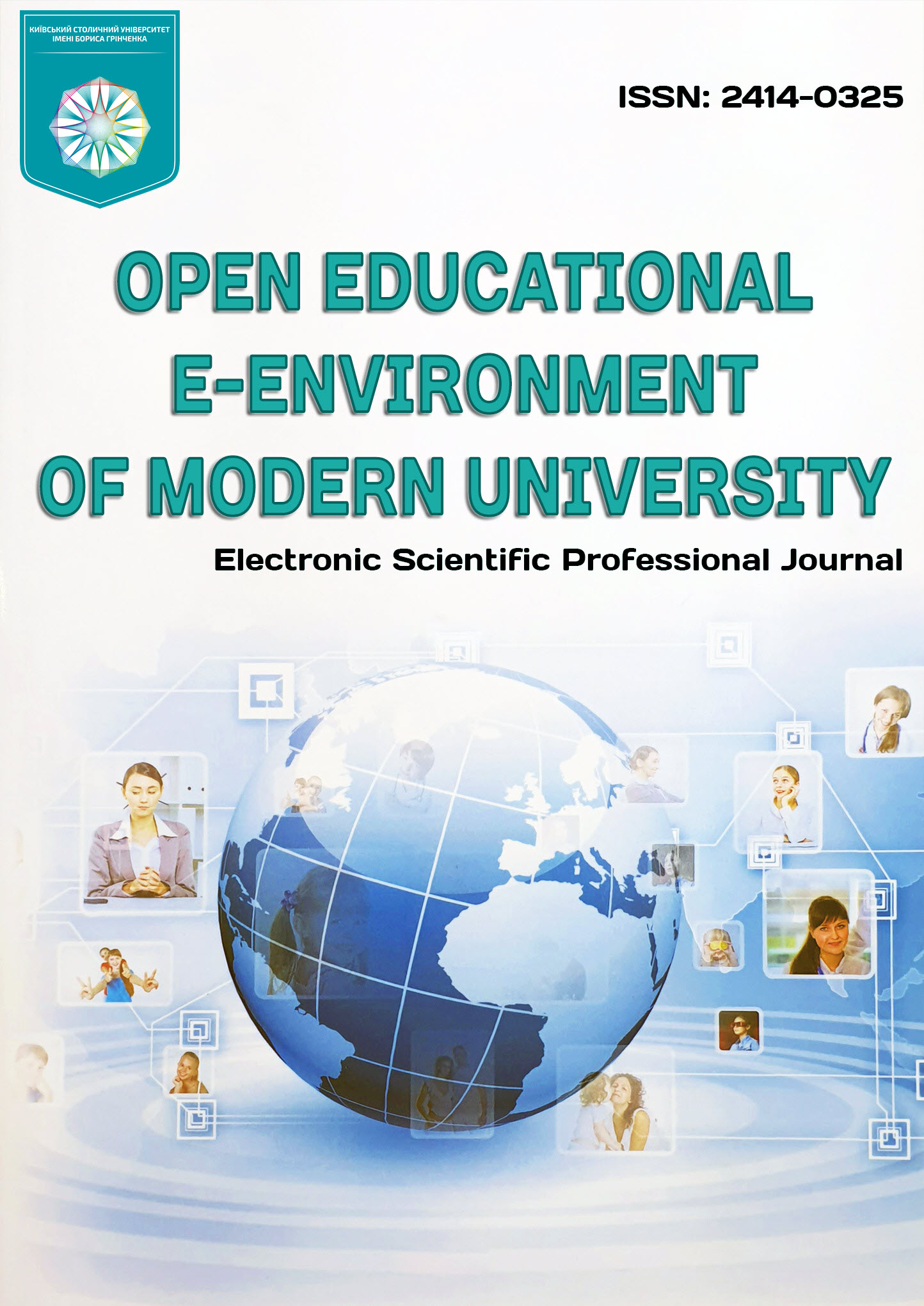ПРАКТИЧНИЙ КЕЙС НАВЧАННЯ УЧНІВ ПРОГРАМУВАННЯ ШЛЯХОМ РЕАЛІЗАЦІЇ НАУКОВО-ДОСЛІДНИЦЬКИХ ПРОЄКТІВ
DOI:
https://doi.org/10.28925/2414-0325.2025.185Ключові слова:
науково-дослідницькі проєкти, науково-дослідницька діяльність, навчання програмування, методика навчання інформатики, педагогічний експеримент, алгоритми сортування, учні, PythonАнотація
Стаття присвячена актуальній проблемі підвищення ефективності навчання
інформатики, зокрема теми програмування в старших класах закладів загальної середньої освіти.
Насамперед, сформульована проблема пов’язана з постійними динамічними змінами змісту
шкільного курсу інформатики, зумовленими стрімким розвитком комп’ютерних систем та
технологій. Сьогодні вивчення інформатики є безпосередньою підготовкою учнів до майбутньої
професійної діяльності в IT та суміжних галузях. Отже, вивчення програмування не обмежується
опануванням базового синтаксису мов програмування, а полягає у вивченні концепцій
алгоритмізації та опануванні сучасних технологій розробки. Саме тому постає необхідність у
пошуку альтернативних ефективних методів навчання, що забезпечують гнучкість та
індивідуальний підхід у навчанні, зокрема програмування.
У статті розглядається метод проєктів, у тому числі науково-дослідницьких, як один із
засобів формування дослідницької компетентності учнів, умінь аналізувати, систематизувати та
узагальнювати знання.
Метою статті є вивчення досвіду реалізації учнями науково-дослідницьких проєктів, у тому
числі на уроках інформатики, з метою підвищення ефективності навчання та мотивації учнів, а
також висвітлення результатів педагогічного експерименту з визначення рівня ефективності
використання науково-дослідницьких проєктів як основного виду навчальної діяльності у процесі
вивчення окремих тем з алгоритмізації та програмування в старших класах закладів загальної
середньої освіти.
Для досягнення поставленої мети було проаналізовано ряд наукових джерел, присвячених
організації проєктної діяльності, зокрема науково-дослідницької. Також у статті наводиться
детальний опис процесу проведення педагогічного експерименту серед учнів 9-х класів під час
вивчення теми “Алгоритми та програми”, а саме алгоритмів сортування масивів даних. Результати
експерименту показали, що ефективність вивчення навчального матеріалу традиційними методами
та шляхом реалізації учнівських науково-дослідницьких проєктів суттєво не відрізняється. Проте,
опитування учнів експериментальної групи виявило позитивне ставлення до використання
науково-дослідницьких проєктів, відзначено підвищення мотивації та розуміння унікальності
кожного результату дослідження. Також встановлено, що робота в парах сприяє успішному
завершенню проєктів.
У висновках зазначається, що реалізація науково-дослідницьких проєктів може бути
ефективним методом навчання за умови системного підходу та контролю з боку вчителя. Також
такий вид діяльності позитивно впливає на розвиток різних компетентностей учнів. Водночас
постає необхідність у подальших дослідженнях для різних вікових груп та тем.
Завантаження
Посилання
Ministry of Education and Science of Ukraine. (n.d.). State standard of basic secondary education. December 23, 2024. https://mon.gov.ua/osvita-2/zagalna-serednya-osvita/nova-ukrainska-shkola-2/derzhavniy-standart-bazovoi-serednoi-osviti (in Ukrainian).
Trosenko, D., & Ostroga, M. (2022). Project Technologies of Informatics Teaching in the 6th Grade. Osvita. Innovatyka. Praktyka, 10(2), 46-54. https://www.oip-journal.org/index.php/oip/article/view/36 (in Ukrainian).
Komyshan, A., & Shchokina, N. (2017). Method of Projects as a Means of Activating Students' Educational and Cognitive Activity. Naukovi zapysky kafedry pedahohiky, 41, 81-93. (in Ukrainian).
Starykh, O. (2008). Project Method in Informatics Lessons – a Way of Developing Students' Information Competence. Informatsiini tekhnolohii v osviti, 1, 155-160. (in Ukrainian).
Wijnia, L., Noordzij, G., Arends, L. R., Rikers, R. M. J. P., & Loyens, S. M. M. (2024). The Effects of Problem-Based, Project-Based, and Case-Based Learning on Students’ Motivation: A Meta-Analysis. Educational Psychology Review, 36(1), Article 29.
Demianenko, V., Polikhun, N. (2006). Research Activity of Student Youth – a Guarantee of Successful Development of Ukrainian Society. Pedahohichni innovatsii: idei, realii, perspektyvy, 2, 57-63.
Tashkenbayevna, N., Kenesbaev, S. M., Zhailauova, M., Elmira, U., Nurzhanova, S. A., & Stambekova, A. S. (2018). Possibilities of the Subject ‘Information and Communication Technologies’ in Accustoming Primary School Students to Research Activities. International Journal of Interactive Mobile Technologies (iJIM), 12(6), 35-46.
Antonova, O. Ye. (2011). Minor Academy of Sciences of Ukraine as a means of developing research abilities of high school students. Osvita obdarovanoi ta talanovitoi molodi – natsionalna problema: materialy vseukrainskoi konferentsii, 1, 15-22. http://eprints.zu.edu.ua/8371/ (in Ukrainian).
Demianenko, V. (2013). Formation of Research Competence of Students of the Minor Academy of Sciences of Ukraine. http://nbuv.gov.ua/UJRN/Nivoo_2013_1_24
Sahin, A. (2013). STEM clubs and science fair competitions: Effects on post-secondary matriculation. Journal of STEM Education, 14(1), 5-11.
Vossen, T. E., Henze, I., Rippe, R. C., Driel, J. H., & Vries, M. J. (2018). Attitudes of secondary school students towards doing research and design activities. International Journal of Science Education, 40, 1629-1652.
Bazurin, V.M., Chashechnikova, O.S., Karpenko, Y.M., Pursky, O.I., Palchuk, P.M. (2022). Interdisciplinary problems of mathematical content as a means of teaching programming to secondary school pupils. J. Phys. Conf. Ser., 2288(1), 012010.
Computer science curriculum for students in grades 5-9 who studied computer science in grades 2-4 (n.d.). January 10, 2025. https://mon.gov.ua/storage/app/media/zagalna%20serednya/programy-5-9-klas/onovlennya-12-2017/8-informatika.docx (in Ukrainian).
Kozolup, Ye. V. (n.d.). Methodical Recommendations for Conducting Student Research and Presenting Its Results. January 10, 2025. https://bit.ly/MRscience (in Ukrainian).
Kozolup, Ye. V. (2023). Some Algorithms for Processing Tabular Data in the Python Programming Language. Tutorial. 9th grade. Sumy. https://www.calameo.com/read/00634669114410c442c19 (in Ukrainian).
Опубліковано
Як цитувати
Номер
Розділ
Ліцензія
Авторське право (c) 2025 Козолуп Є. В.

Ця робота ліцензується відповідно до Creative Commons Attribution-NonCommercial-ShareAlike 4.0 International License.













1.jpg)








